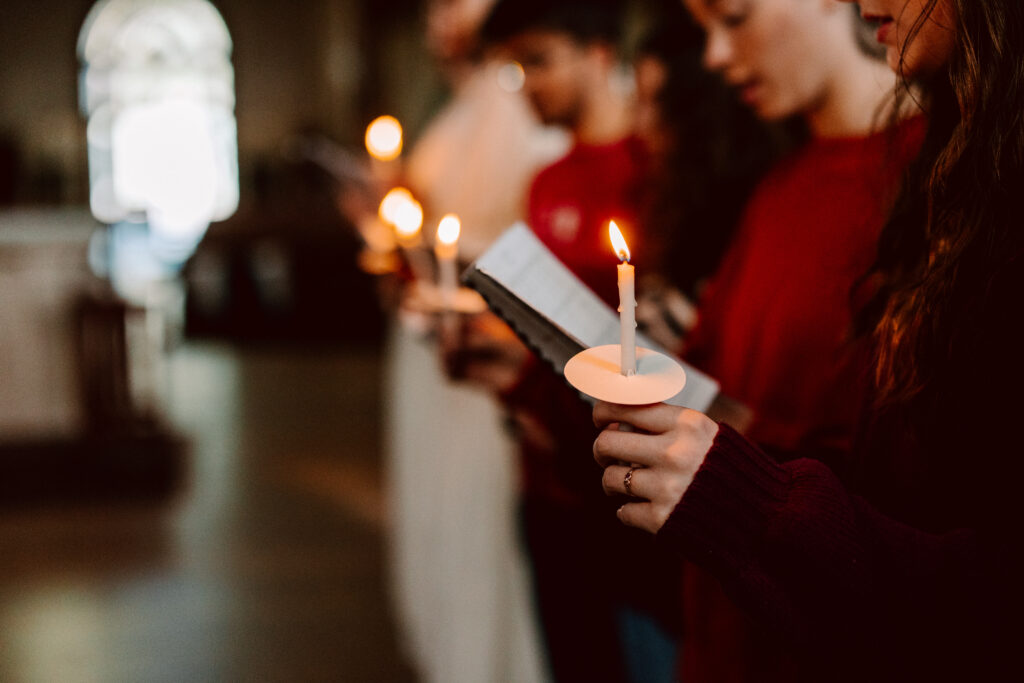Welcome to Mass
Welcome
Thank you for taking some time to learn about the celebration of Holy Mass at Providence College. It is the very center of our campus life.
We understand that participating in Mass is a new experience for many. You may be unfamiliar with the prayers and flow of the liturgy. To orient and support you, we’ve created the brief instructional video below. It will discuss the history and shape of the liturgy, as well as some recommendations for participating. We hope you find it to be a welcomed invitation. Below the video, we’ve included some deeper questions about receiving the Eucharist.
Deeper Questions about the Holy Eucharist
What is the Holy Eucharist?
From the Youth Catechism of the Catholic Church:
“Holy Eucharist is the sacrament in which Jesus Christ gives his Body and Blood- himself- for us, so that we too might give ourselves to him in love and be united with him in Holy Communion. In this way we are joined with the one Body of Christ in the Church” (Catechism of the Catholic Church, 1322, 1324, 1409, 1413)
After Baptism and Confirmation, the Eucharist is the third sacrament of initiation of the Catholic Church. The Eucharist is the mysterious center of all these sacraments, because the historic sacrifice of Jesus on the Cross is made present during the words of consecration in a hidden, unbloody manner. Thus the celebration of the Eucharist is “the source and summit of the Christian life” (Second Vatican Council, Lumen Gentium, 11). Everything aims at this; besides this there is nothing greater that one could attain. When we eat the broken Bread, we unite ourselves with the love of Jesus, who gave his body for us on the wood of the Cross; when we drink from the chalice we unite ourselves with him who even poured out his blood out of love for us. We did not invent this ritual. Jesus himself celebrated the Last Supper with his disciples and therein anticipated his death; he gave himself to his disciples under the signs of bread and wine and commanded them from then on, even after his death, to celebrate the Eucharist. “Do this in remembrance of me” (1 Cor 11:24).
Our sharing in the Body and Blood of Christ has no other purpose than to transform us into that which we receive.
Pope St. Leo the Great
Who receives the Holy Eucharist?
From the Youth Catechism of the Catholic Church:
Holy Communion is the expression of the unity of the Body of Christ. To belong to the Catholic Church, one must be baptized in her, she her faith, and live in union with her. It could be a contradiction if the Church were to invite to Communion people who do not (yet) share the faith and life of the Church. It would damage the credibility of the sign of the Eucharist. (Catechism of the Catholic Church, 1398-1401).
How does Holy Communion change me? What sort of preparation do I need to receive Holy Communion?
From the Youth Catechism of the Catholic Church:
Every Holy Communion unites one more deeply with Christ, making them a living member of the Body of Christ, renewing the graces they have received in Baptism and Confirmation and fortifies them for the battle against sin. (Catechism of the Catholic Church, 1391-1397, 1416).
Someone who would like to receive Holy Eucharist must be Catholic. If he has serious sin on his conscience, he must first make a confession. Before approaching the altar, one should be reconciled with his neighbors (Catechism of the Catholic Church, 1389, 1417).






